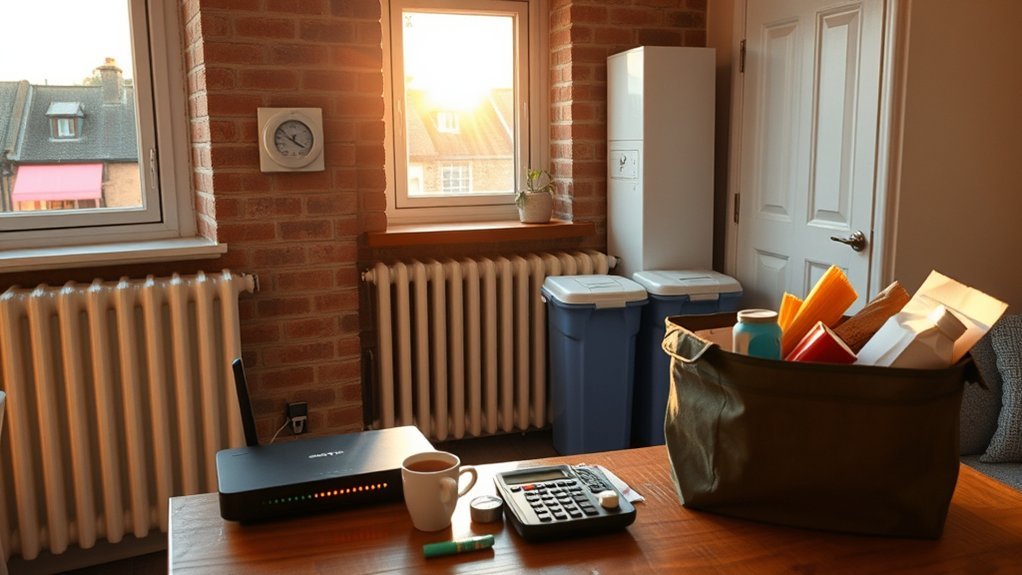You’ll need roughly £1,400–£1,900 a month to live comfortably in Exeter as of February 2026. This depends on university halls, shared house, or private one-bed. Expect halls or shared rooms at £180–£220/week, one-beds £900–£1,100/month, utilities/internet £200–£280/month if separate. Factor groceries £200–£300, transport £50–£70, entertainment £50–£100. Plan for deposits and setup costs. See breakdowns and tips below.
The average cost of living in Exeter for students in 2026 is £1,400–£1,900 per month. This covers accommodation (£700–£1,000), food (£250), utilities (£220), and transport (£60). Students save with discounts and shared housing.
Key takeaways
- Budget £1,400–£1,900 monthly for comfortable student life in Exeter.
- Rent takes the most at £700–£1,000. Pick shared or halls to save.
- Cut costs by 20% with discounts on transport, food, and entertainment.
Monthly Rent and Accommodation Options

Where you live in Exeter depends on your budget and if bills are included. As of February 2026, university halls cost £180–£220 per week. Private shared houses run £160–£190 per week. Luxury studios go for £260–£310 per week. A one-bedroom in the city centre averages £1,100 per month. Outside the centre, it’s £900. A three-bed in the centre is £1,900–£2,300. All-inclusive options like Study Inn bundle utilities and Wi-Fi. This simplifies your budget. Lower rent often means self-catered with variable bills. Premium options add predictability. Check the University of Exeter’s official living costs guide before deciding. Model monthly totals for each type first.
Typical Grocery and Food Expenses

Plan groceries around self-catered costs of £200–£300 per month as of February 2026. Weekly shops are £50–£70. Stick to basics from Tesco, Sainsbury’s, or Aldi. Think pasta, stir-fries, tray-bakes. Add eating out £70–£100, coffee/snacks £50–£70. Unit prices: milk £1.10/L, bread £1.00/500g, chicken £7.00/kg. Farmers’ markets give value on produce.
Grocery Budgets Weekly/Monthly
Budget £200–£300 monthly for self-catered groceries. £60 weekly shops work for many students. Add £70–£100 for eating out, £50–£70 for snacks. Supermarkets like Aldi have deals. Farmers markets cut produce costs. Items: bread £1.00, milk £1.10/L, apples £2.00/kg, tomatoes £2.80/kg. Use lists and bulk buys with flatmates. Share deliveries to control spend.
Affordable Meal Ideas
Keep meals cheap and nutritious with £200–£300 monthly groceries. Shop weekly for staples like milk, eggs, tomatoes. Bulk buy with flatmates. Rotate omelettes, pasta with veggies, rice bowls, soups from markets. Limit eating out to £70–£100 mid-range or fast food. Coffee costs £50–£70. Share packs and track spending. Compare supermarkets vs markets for efficiency.
Cheap Supermarket Choices
Groceries run £200–£300 monthly for self-catered students. Add £70–£100 eating out, £50–£70 snacks. Compare Tesco/Sainsbury’s with Aldi for value. Farmers markets offer fresh items like cheese, potatoes at good prices. Use lists and bulk with friends. Share deliveries. International shops give cheap staples and deals to stretch budgets.
Utility Bills, Internet and Household Essentials

Budget for monthly utilities as of February 2026: electricity £90–£110, gas £70–£90, water £40–£50, TV Licence £13.50, internet £30–£45. All-inclusive housing bundles these. Otherwise, handle separate contracts. Add household essentials like cleaning and toiletries for regular small costs.
Typical Monthly Utility Costs
Monthly utilities in shared housing: electricity £90–£110, gas £70–£90, water £40–£50, TV Licence £13.50. Internet £30–£45. Premiums bundle faster speeds. Council Tax £1,400–£3,000 yearly. Check exemptions. Average for 85m²: £350. Tally against rent (£900–£1,100 one-bed) to forecast and cut costs.
Internet and Connectivity Options
Internet costs £30–£45 standard. Premiums £45+ for speed. Shared: utilities £60–£80/person, water £25–£35, internet £30–£40. Student housing often includes Wi-Fi. TV Licence £13.50. Bundles offer predictability. Separates save if usage is low.
| Option | Typical monthly cost | Notes |
|---|---|---|
| Standard internet | £30–£45 | Basic speed |
| Premium bundle | £45+ | Faster speeds |
| Shared utilities+internet | £100–£150 | Per household |
| All-inclusive student rent | Varies | Utilities included |
Household Essentials and Supplies
Budget utilities with rent: electricity £90–£110, gas £70–£90, water £40–£50, internet £30–£45. TV £13.50. Average 85m²: £350, internet £40. Council Tax £1,400–£3,000. Exemptions apply. Bundles like Study Inn simplify. Plan for mobile and energy variations using ranges.
Transport, Commuting and Mobility Costs

Exeter favors public transport and active travel. Stagecoach student passes cost £70 monthly for unlimited. Standard is £90–£100. One-way £2.00–£3.50. Add trains £30–£60 monthly, bike upkeep £20–£30. Bike facilities and walking reduce costs. Assess passes vs pay-as-you-go for optimization.
Entertainment, Social Life and Leisure Spending

Enjoy Exeter affordably with discounts. Cinema £10–£14, night out £30–£50, weekend trips £70–£130. Arts, music, pubs, Dartmoor offer low-cost options. Use UNiDAYS, Student Beans for cuts.
- Use student discounts for tickets.
- Opt for quizzes, free gigs, picnics over expensive nights.
- Limit trips to one monthly, share costs.
- Explore Dartmoor and parks cheaply.
- Reusable cup saves on coffee.
Set £100 monthly entertainment budget analytically.
Health, Fitness and Wellbeing Costs

Factor gyms, classes, GP/medication, mental health: on-campus or Study Inn bundles lower costs. Use UNiDAYS, NUS Totum for discounts. Universities offer free peer activities. Access subsidised counselling via Student Space. Track spending, set contingency, choose bundled services for affordability.
Part‑time Work, Earnings and Financial Planning

Part-time work fits budgets up to 20 hours weekly on student visa. At £12.71/hr (21+ as of April 2026), full allowance nets ~£900–£1,000 monthly after tax. Supplements rent, food.
- Use as extra for essentials.
- Track with apps against UK costs.
- Monitor shortfalls quickly.
- Balance with wellbeing; use Student Space.
- Compare to average net £2,300 monthly.
Calculate net monthly, subtract fixed costs for discretionary planning.
Money‑saving Tips and Student Discounts

Cut outgoings with discounts: UNiDAYS, Student Beans for food, transport. Track groceries (£200–£300), snacks (£50–£70) via apps.
| Strategy | Typical saving | Action |
|---|---|---|
| Discount platforms | £10–£25/month | Activate codes |
| All‑inclusive rent | £0 utilities hassle | Study Inn bundles |
| Smart shopping | £20–£40/month | Aldi deals, bulk staples |
Halls include utilities; shared £160–£190/week. Monitor electricity £90–£110, gas £70–£90; switch bundles. Reserve for setup; maintain standards.
Comparison to Other UK Cities
Exeter stays affordable compared to bigger cities. Monthly costs here beat London’s £2,000+ average. Bristol runs £1,500–£1,800, closer but higher on rent. Smaller spots like Plymouth dip to £1,200. Use discounts to keep Exeter competitive.
Moving In: One‑off and Initial Setup Costs

Moving to Exeter exceeds first rent; budget setup beyond £900 city-centre one-bed average. Bedding, kitchenware, cleaning add up. All-inclusive like Study Inn covers utilities but includes deposits. Separate: electricity £90–£110 first bill. Reserve contingency for extras.
Moving into Exeter costs more than rent — budget setup, utilities, deposits, contingency.
- Bedding, furniture (toppers, curtains).
- Kitchen (pots, utensils, kettle).
- Deposits, fees.
- Initial food, cleaning.
- Contingency for surprises.
FAQs
How much are bills in Exeter?
Bills in Exeter typically run £300–£450 monthly for shared utilities, internet, and council tax; bundle services and monitor energy use to reduce costs.
Is Exeter cheap to live in?
Yes, Exeter’s one-bedroom city-center rent averages £1,000, making it affordable compared to London; use budgeting tips for groceries and transport.
How much is student rent in Exeter?
Student rent is £180–£220/week for halls, £160–£190/week for shared housing, or £260–£310/week for studios, varying by bills inclusion.
How much does a pint cost in Exeter?
A pint in Exeter pubs costs about £5.50; student discounts keep social prices competitive during events.


